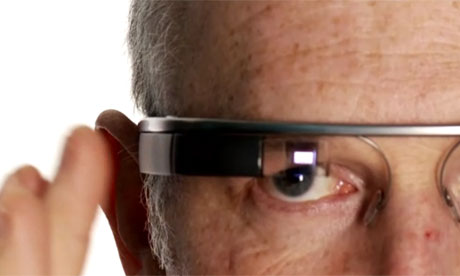
Google Glass has yet to launch in the UK, but the Department of Transport says wearers are likely to be subject to the same penalties as drivers who use mobile phones. Photograph: Guardian
Google Glass is the highest profile product in a wave of new wearable technologies, promising to display everything from restaurant reviews to directions and allow automated video and photos wherever we go. But the internet-connected eyewear looks set to be banned on the UK's roads even before the product's 2014 launch, according to the Department of Transport.
A spokesman for the department told Stuff, a gadget magazine, that the device could distract drivers while they are behind the wheel, defining Glass as a similar distraction to a mobile phone.
"We are aware of the impending rollout of Google Glass and are in discussion with the police to ensure that individuals do not use this technology while driving," said the spokesman.
"It is important that drivers give their full attention to the road when they are behind the wheel and do not behave in a way that stops them from observing what is happening on the road."
He pointed to offences including driving without due attention and careless driving, which is due to become a fixed penalty offence in late 2013. Since a ban on using mobile phones while driving was introduced in 2003, more than one million drivers have been convicted – typically issued with a £60 fixed penalty notice and three points on their driver's licence.
The statement by the Department for Transport indicates that Google Glass users would be subject to the same penalty under the 1988 Road Traffic Act. It reflects similar concerns in the US, where Glass has been launched to a small trial group of "explorers". Politicians in Delaware and West Virginia have introduced bills that ban drivers wearing computing technologies while driving.
"We are thinking very carefully about how we design Glass because new technology always raises new issues," said Google in a statement. "Our Glass Explorer programme, currently only launched in the US, reaches people from all walks of life and will ensure that our users become active participants in shaping the future of this technology."
Technology fans argue that Glass, which displays simple, monochrome information in the wearer's peripheral vision, is less distracting than satellite navigation tools that include a visual interface designed to be used while driving.
Developers have already begun exploring applications for Glass, including GlassTesla, which allows owners of the high-end electric cars to remotely control the car's air conditioning, mileage and battery information as well as directions.
No comments:
Post a Comment